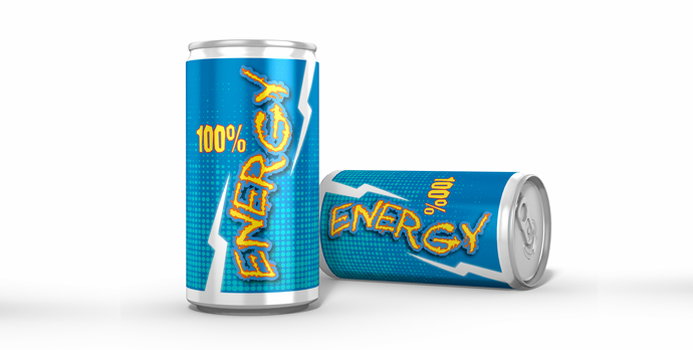Everybody loves caffeine. Okay, the majority of people love caffeine — and about four out of five Americans consume it on a daily basis.
Studies have shown that in low doses, this naturally occurring stimulant found in the leaves of more than 60 plant species is relatively harmless. One or two cups of coffee per day may even have mental and physical health benefits, including improved concentration and memory, reduced fatigue, increased stamina, preventing weight gain, and faster reaction times.
Of course, as with any drug, there are consequences if you take too much. At super-high levels—say, after five back-to-back cups of java — caffeine can be toxic, triggering side effects such as nausea, heart palpitations, anxiety, tremors, and headaches. Among a small percentage of people, too much caffeine can even cause mania, hallucinations, or strokes.
What does all this have to do with energy drinks? Well, not all energy drinks contain sky-high levels of caffeine. But the vast majority do. With other active ingredients thrown in — namely taurine, guarana, or ginseng — energy-in-a-can can be a dangerous cocktail, especially for those that make drinking it a habit.
Part of the problem is that unlike coffee and tea, energy drinks haven’t been around for a long enough for us to understand their long-term effects. Additional ingredients haven’t been widely studied, so we know very little about how they interact with other psychoactive substances, such as caffeine, or what kinds of effects they can have on the human body over time.
Moreover, “energy drink” isn’t a one-size-fits-all label. Some energy drinks are more dangerous than others.
So, what do we know?
Energy Drinks May Damage Cardiovascular Health
It’s fairly clear that energy drinks may have some worrisome consequences for your heart. Long-term or excessive consumption of energy drinks has been linked to heart failure. The New York Times reported that 5-Hour Energy has been cited in at least 13 death reports submitted to federal officials. Between 2009 and 2012, the product was cited in over 90 filings with the FDA.
Other studies have shown that energy drinks can increase blood pressure, heart rate, and cause arrhythmia as well as unusually forceful heart contractions. For people with underlying cardiac conditions, this can be especially dangerous.
Based on reports, children and teens seem more susceptible to heart-related effects — a serious concern, considering these drinks are sweeter than other caffeinated drinks and marketed to a younger demographic. What’s more, anyone can buy energy drinks. Unlike alcohol or cigarettes, there’s no legal age.
Other Side Effects Are Similar to Overconsumption Of Caffeine
Too much caffeine can have serious side effects — including anxiety, insomnia, risky behavior, jitters, and the increases in stress hormones such as norepinephrine. In addition, regular consumption of energy drinks can lead to symptoms of caffeine withdrawal, including severe headaches and migraines.
Among pregnant women, excess caffeine consumption has been linked to an increased risk of miscarriage.
Mixing Energy Drinks With Alcohol is a Recipe For Disaster
Vodka Red Bulls have become a staple choice for clubbers who want that extra boost of energy to dance until the wee hours.
But just how bad for you are they? According to a study, partiers who mixed alcohol and energy drinks were six times more likely to experience heart palpitations, four times more likely to have difficulty sleeping, and generally more likely to experience tremors, “jolt-and-crash” episodes, and irritability.
But even more worrisome is the fact that a study of over 1,000 college students reported that those who frequently downed energy drinks were two and a half times more likely to meet the diagnostic criteria for alcohol dependence. The connection may have to do with the neurochemical effects of caffeine in mitigating addiction, as well as the popular idea that caffeine is a good way to cure a hangover.
Bottom Line?
Energy drinks aren’t a substitute for good old-fashioned sleep. If you’re getting enough sleep, eating well, and exercising regularly, you shouldn’t have to rely on energy drinks to stay awake. Having one once in a while may not be a bad thing, but making it a habit will wreak havoc on your health.
[Image via Getty]



